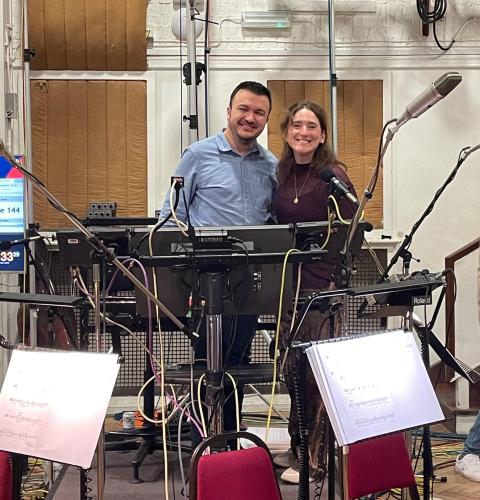Berklee Valencia Talent Helps Score Alejandro Amenábar’s El cautivo

Faculty member Sergio Jiménez Lacima and alumna Lucía Vázquez Montenegro MM ’20 at Abbey Road Studios
Photo courtesy of Lucía Vázquez Montenegro
Alejandro Amenábar’s latest film, El cautivo (The Captive), offers a new cinematic look at one of Spain’s most enduring literary figures: Miguel de Cervantes. This Spanish-Italian coproduction revisits the author’s years in captivity in Algiers and explores how storytelling became his means of survival and hope. The film’s score features the work of Berklee Valencia faculty and alumni, including the film’s music producer Lucio Godoy, director of the scoring for film, television, and video games graduate program; faculty member Sergio Jiménez Lacima; and alumna Lucía Vázquez Montenegro MM ’20.
Turning Coursework Into Career Work
For more than two decades, Godoy has collaborated with Amenábar on acclaimed soundtracks including The Others, The Sea Inside, and While at War. On El cautivo, he joined the project in its early stages as a music producer, overseeing budgets, assembling the team, and coordinating the recording sessions at Abbey Road Studios in London, among other crucial tasks.
As both producer and educator, Godoy sees these projects as a reflection of what Berklee Valencia offers its students: a bridge between academic training and industry reality. “Our goal is to bring master’s degree students as close as possible to the professional world,” he says. “They learn how to manage tight deadlines, lead recording sessions with professional musicians, keep the creative process flowing under pressure, and overall, deal with the unexpected.”
Building Confidence Behind the Console
For Vázquez, joining the El cautivo team was both a professional challenge and an incredibly rewarding experience. Her role combined technical precision and creative coordination, overseeing the transfer and cleanup of digital sessions, preparing orchestral scores and parts, and ensuring they were delivered on time to everyone who needed them.
Vázquez even recorded some vocals for the project, which she describes as an “unexpected but fun surprise.” She recalls it as an intense but enriching experience that helped her grow, and reminded her ”how inspiring it is to work alongside such a talented and caring team.”
Using real-world projects in the classroom helps students see how things are done today at a professional level.
—
She credits her time at Berklee Valencia for preparing her to thrive in such high pressure environments, underlying the graduate program’s focus on recording deadlines, editing, and score preparation, which she described as “absolutely essential” for this project. Beyond the technical training, Vázquez says that one of the most valuable lessons she took from her education at Berklee Valencia is the importance of rest and balance when working on demanding projects.
In this sense, her advice for current students is simple yet meaningful. “Take a deep breath and stay patient,” she says, adding that a career in scoring “is a marathon, not a sprint.” Each path is unique, she says, and it’s vital to stay curious, enthusiastic, and creative while cultivating personal well-being along the way.
This mindset served her well after graduating. Today, she feels fortunate to choose the projects she takes on, staying true to her own style and vision. Looking ahead, she hopes to begin composing her own music “just for the love of it” and continue exploring other fields such as music technology, an area she has been studying in recent years.
Lessons from Working Composers
Building on his previous collaboration with Godoy and Amenábar on While at War, Jiménez was once again entrusted with bringing the director’s musical vision to life in the studio on El cautivo, orchestrating and conducting the recording sessions at Abbey Road.
A strength of the master’s degree program is that its faculty are active professionals in the scoring industry, which helps Jiménez integrate these kinds of experiences directly into his teaching while showing students how theory translates into practice. “Using real-world projects in the classroom helps students see how things are done today at a professional level,” he says. “This industry evolves constantly, and staying current is essential.”
Jiménez also emphasizes that film scoring is a team effort. “When we talk about scoring for film, television, or video games, I emphasize the word for,” he says. “The easy part is writing music. The hard part is earning the opportunity to write it.”
